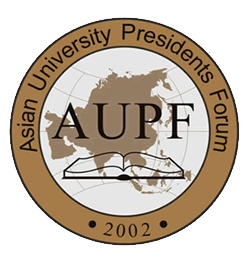

Date: October 11-12, 2003
Location: Guangzhou, China
Host University: Guangdong University of Foreign Studies
Number of Attendees: 114
Number of Participating Countries and Regions: 7
Number of HEIs attending: 20
Theme: Globalization of Higher Education in Asia
Main Contents:
The 2nd session of the Asian University Presidents Forum (AUPF) was held by Guangdong University of Foreign Studies from October 11 to 12, 2003. Over 30 university presidents from over 20 HEIs gathered in the “City of Rams” to discuss the development and cooperation of higher education in Asia against the backdrop of economic globalization, and to seek approaches for common development.
The primary task of the Asian University Presidents Forum was recognized as being to establish a platform for communication and exchanges on personnel training, academic research and social services in the spirit of free will, equality, and friendship; and to develop new areas and approaches to expand bilateral as well as multilateral communications and cooperation.
This session renamed the draft Constitution signed during the First Presidents Conference of Sino-Thai Higher Education Institutions as the Constitution of the Asian University Presidents Forum which later came into effect after being signed by the presidents attending this session. The forum, having attracted universities from a number of countries and regions in South and East Asia, also decided the hosts for the following sessions of the Asian University Presidents Forum.
This session centered on Globalization of Higher Education in Asia. All participants were given a stage to air their own opinions regarding the methods of realizing educational internationalization. By giving full consideration to the inevitable trend of educational internationalization under economic globalization and the influence it exerts on educational philosophy, talent training models and talent markets, the participants put forward some approaches toward educational internationalization for China’s higher education sector: the western model must not be copied in the course of educational internationalization, and educators must be fully aware of local culture and conditions before making moves to develop Asian education. An internationalized path of running universities with local characteristics must be taken. The forum also discussed the methods and goals of training internationalized talents as well as the necessary capabilities and qualities that such talents should possess. Participants also shared views on the orientation of education and universities. The delegate from Guangdong Academy of Social Sciences believed that Guangdong should learn from the international experiences during the course of development of its higher education, and give consideration to both rationality and practicability of education. Against the backdrop of the market economy, the training of university talents must be self-oriented and cannot be fully decided by market needs. The discussions during the forum also covered thoughts on discipline development, faculty development, university management and the development of business education under globalization, as well as the sharing of educational resources in Asia through the help of an Asian HEI network.

